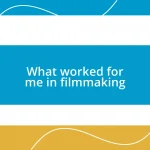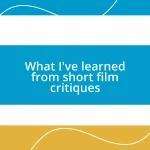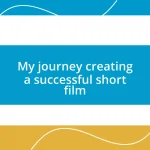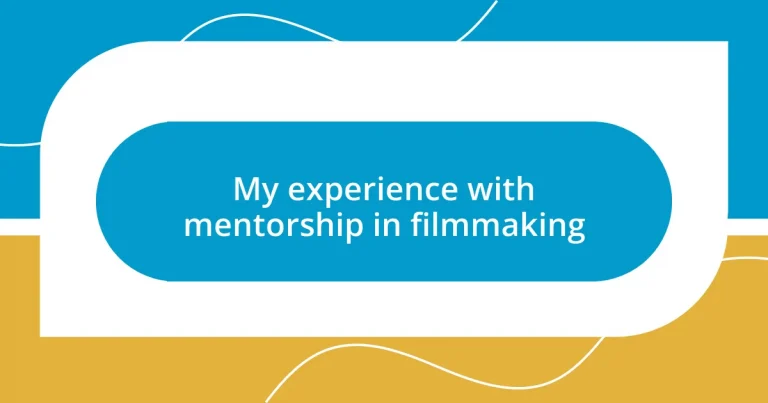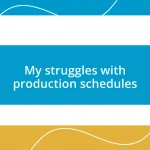Key takeaways:
- Mentorship in filmmaking is crucial for personal and professional growth, offering a safe space for creativity and skill development.
- Finding the right mentor involves alignment in goals and creative vision, ensuring a partnership that nurtures the mentee’s journey.
- Active engagement and open communication with mentors enhance the learning experience, while reflecting on the mentorship journey fosters growth and resilience.
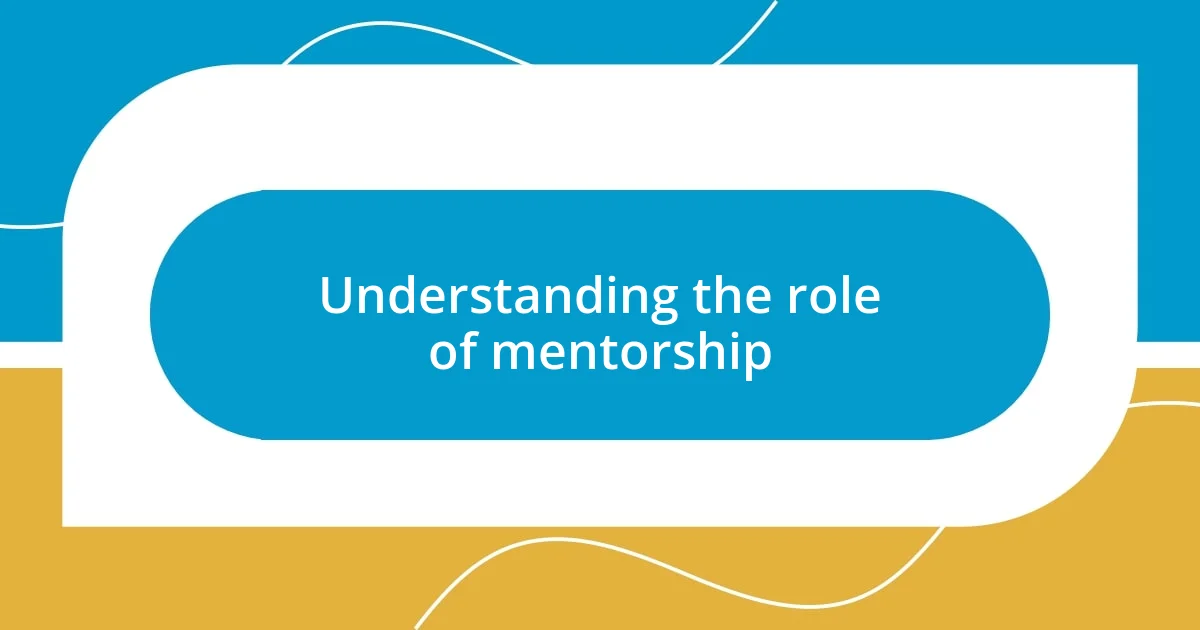
Understanding the role of mentorship
Mentorship in filmmaking serves as a vital support system, guiding aspiring creators through their journey in an industry that can often feel overwhelming. I remember my first film set; I felt lost, unsure of my role. However, my mentor took the time to explain not just the technical aspects but also the storytelling techniques that make a film resonate. Isn’t it incredible how one person can unlock your potential just by sharing their experiences?
The relationship between a mentor and mentee is not just about professional guidance; it’s about building a safe space for creativity and growth. During my mentorship, we didn’t just discuss scripts; we shared personal stories, fears, and dreams about the future of filmmaking. This emotional bond created an environment where I felt comfortable experimenting with my ideas. Have you ever found yourself in a situation where someone’s belief in you made all the difference?
Ultimately, understanding the role of mentorship means recognizing the profound impact it can have on your confidence and skills. I’ve seen many newcomers flourish under the watchful eyes of their mentors, proving that this dynamic can transform mere potential into tangible results. What if we could all be that guiding light for someone else, just as our mentors illuminated the path for us?
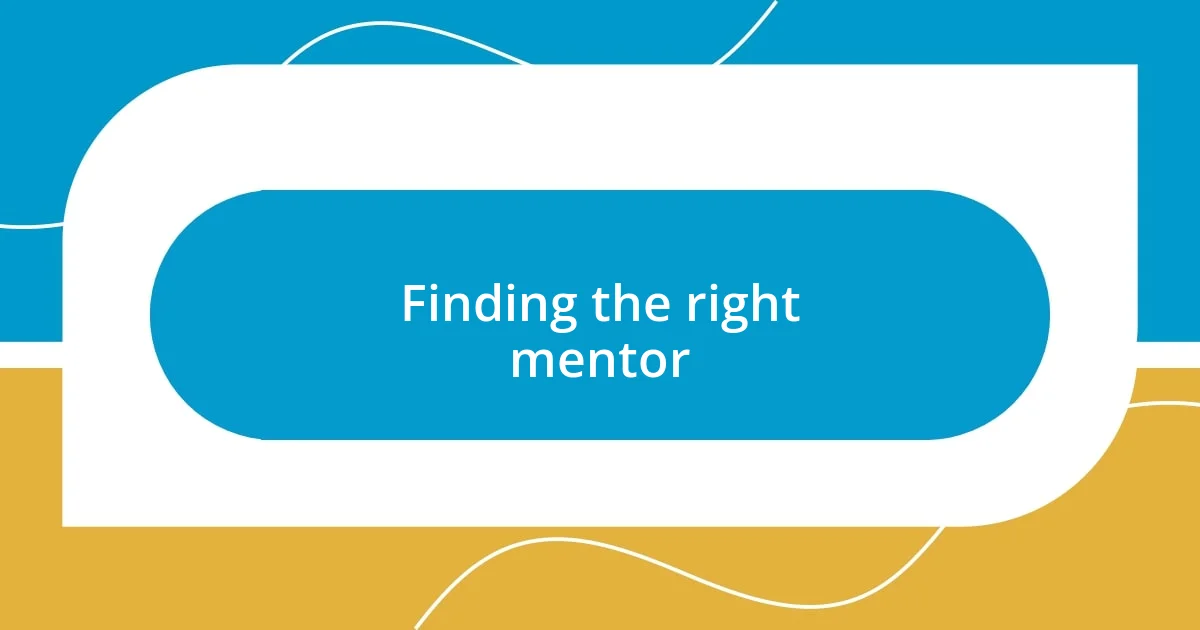
Finding the right mentor
Finding the right mentor is crucial in shaping your filmmaking journey. I’ve learned that not every experienced filmmaker will fit your needs. I remember reaching out to someone whose work I admired but quickly realized our creative visions clashed. This experience taught me the importance of alignment—mentorship should feel like a partnership, not just a checkbox on your career path.
Here’s a quick guide for finding the right mentor:
- Identify Your Goals: Be clear about what you want to achieve in your filmmaking journey.
- Research Their Background: Look into their filmmaking style and experience. Do they resonate with your aspirations?
- Seek Out Compatibility: It’s essential that your personalities and creative visions align; not everyone will inspire you.
- Engage with Them: Start conversations to understand their mentoring style and see if it fits yours.
- Evaluate Their Availability: Ensure they have the time to dedicate to your development—mentorship requires commitment on both sides.
Finding the right mentor can feel daunting, but it’s about building a connection that nurtures your growth as a filmmaker.
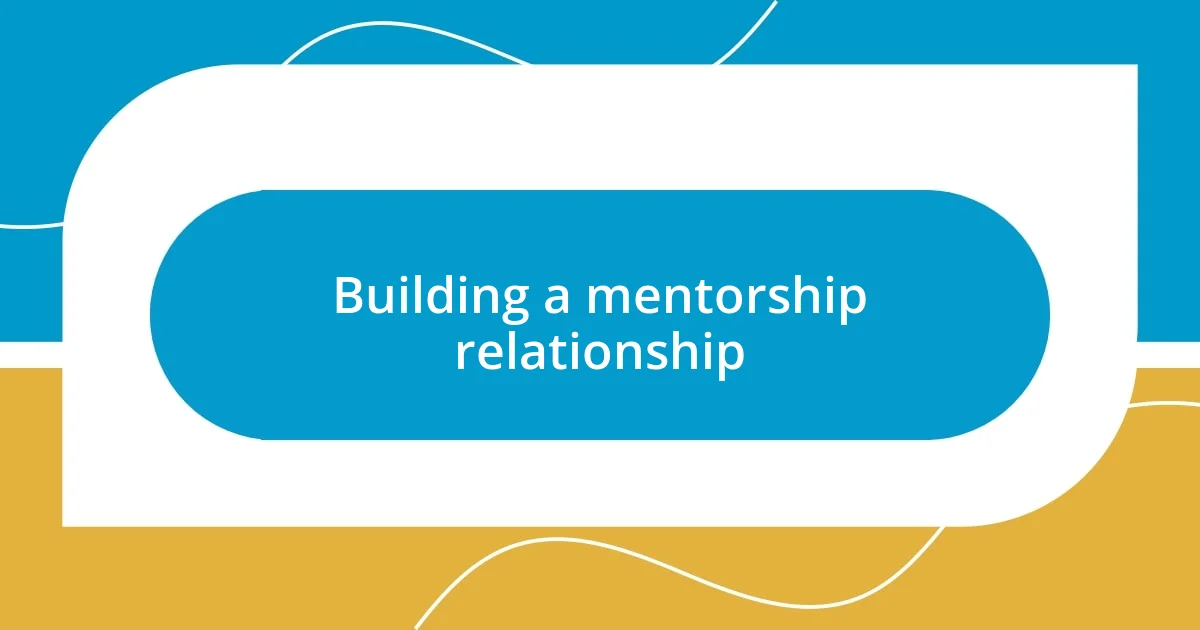
Building a mentorship relationship
Building a mentorship relationship involves a blend of openness, trust, and clear communication. From my experience, when I first connected with my mentor, there was an instant recognition of our shared passion for storytelling. This initial spark set the tone for our relationship, making discussions feel more like collaborative brainstorming than formal meetings. Have you ever approached someone you admired, only to discover how comfortable the conversation became? It reinforces the idea that building rapport is foundational.
Investing time in regular interactions can deepen the mentorship bond. I remember scheduling bi-weekly meetings with my mentor where we not only critiqued my work but also discussed recent films, industry trends, and a bit about life outside filmmaking. This practice taught me that mentorship isn’t solely about technical skill—it also encompasses broader life lessons and support. Building a mentorship relationship means understanding that these shared moments can lead to more meaningful guidance.
A mentorship relationship should evolve over time. It’s vital to check in with each other about expectations and how the dynamic feels. I found it immensely valuable to ask for feedback on how I could improve as a mentee. This practice not only signifies dedication but also opens the door for constructive dialogue. I’ve seen mentorships flourish when both parties are willing to adapt and grow together.
| Aspects | Actions |
|---|---|
| Building Trust | Share your stories and be open about your aspirations. |
| Regular Interactions | Set bi-weekly meetings for consistent engagement and support. |
| Feedback Loop | Ask for and give feedback to foster growth on both sides. |
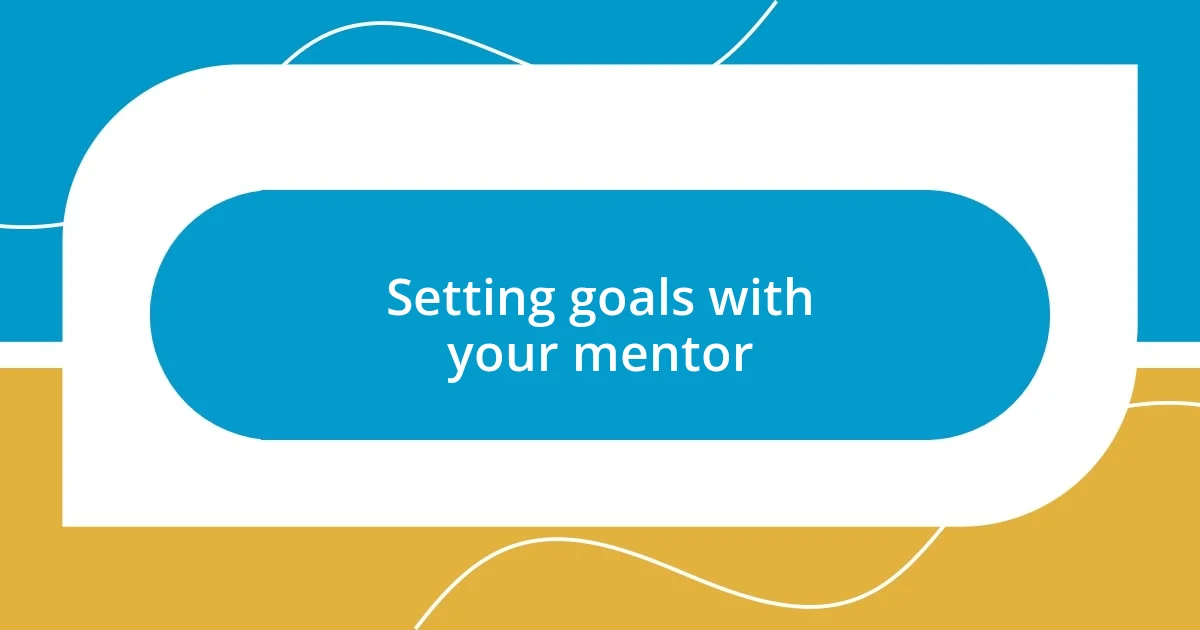
Setting goals with your mentor
When it comes to setting goals with your mentor, clarity is essential. I vividly remember my first meeting with my mentor, where we sat down together and laid everything out on the table. It felt a little daunting at first, but I found that articulating my ambitions gave me a sense of direction. Have you ever noticed how defining your objectives can unveil new possibilities? By pinpointing what I wanted to achieve, such as learning about cinematography or mastering scriptwriting, it made our discussions much more productive.
Once we’ve established those goals, it’s equally important to revisit them regularly. I recall a point in my journey where my mentor challenged me to take on a project that felt out of my comfort zone. At first, I hesitated; it was an ambitious goal that ignited a mix of excitement and fear in me. However, we scheduled regular check-ins to monitor my progress. This adaptive approach not only kept me accountable but also allowed my mentor to provide tailored guidance based on my evolving journey.
Lastly, it’s invaluable to involve your mentor in refining those goals. I often found myself asking, “What do you think of this direction?” Their insights shaped my path in ways I hadn’t expected, steering me toward opportunities I might have overlooked. I deeply appreciated the times when they shared their own stories of setbacks and triumphs in goal-setting; it made the process feel less solitary. Ultimately, this collaboration helped cultivate a fruitful partnership where both of us learned and grew together.

Learning from experiences and feedback
Feedback is invaluable in the filmmaking journey. I remember receiving notes from my mentor after sharing a rough cut of my first short film. Some of the comments stung at first, but they opened my eyes to aspects I hadn’t considered, like pacing and character development. Have you ever had a moment where you realized that what you thought was polished could use some honest critique? That experience taught me that feedback is not just criticism; it’s a doorway to growth.
I’ve found that incorporating feedback requires a certain mindset—one that embraces vulnerability. Once, while working on a screenplay, I was eager to hear my mentor’s thoughts. To my surprise, their detailed critique revealed significant flaws I had overlooked. Instead of feeling defeated, I felt motivated to revise and improve. This taught me that embracing feedback can strengthen my skills. Have you ever felt that initial sting of criticism turn into motivation? It’s a powerful shift that propels you forward.
Furthermore, revisiting past feedback during subsequent projects has been enlightening. I keep a journal of critiques and lessons learned, which serves as a guiding star in my journey. There’s something rewarding about reflecting on my growth and recognizing patterns in feedback. Has your journey ever been mapped out by the lessons you’ve received? For me, it’s a constant reminder that every piece of feedback is a stepping stone toward becoming a more versatile filmmaker.

Maximizing your mentorship opportunities
Maximizing mentorship opportunities means actively engaging with your mentor. I found that the more questions I asked, the more insights I gained. Have you ever entered a meeting unsure of what to ask? During one of my sessions, I prepared a list of specific questions about camera techniques. This not only sparked a deep conversation but also led to discovering techniques I wasn’t even aware of. It struck me how a proactive approach could unveil a wealth of knowledge.
Building rapport with your mentor is another crucial element. I remember inviting my mentor to watch a screening of my latest film project. Sharing that experience with them felt intimate and meaningful. It created an opportunity for honest and open feedback, as well as a chance to bond over shared passions. In those moments, I realized that mentorship is as much about personal connection as it is about professional guidance. Have you considered the power of shared experiences in your own mentorship?
Finally, I learned to seek out diverse perspectives beyond my mentor. During networking events, I made it a point to chat with others who worked in different areas of filmmaking. I remember speaking with a sound designer who shared a unique approach to audio that transformed my understanding of storytelling. This taught me that while your mentor plays a vital role, expanding your circle can deepen your learning and inspire fresh ideas. Have you ever left a conversation with someone unexpected and felt inspired? It’s amazing how varied insights can enrich your creative journey.
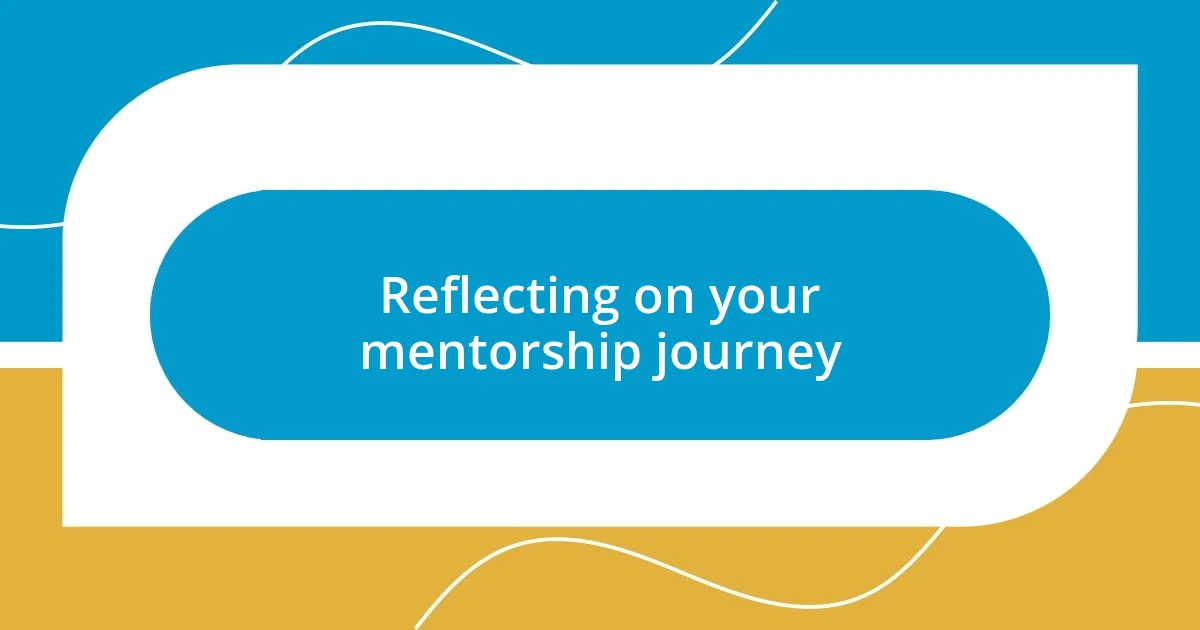
Reflecting on your mentorship journey
Reflecting on my mentorship journey often brings a wave of nostalgia mixed with gratitude. I recall sitting in a quiet café, sharing my ambitions over coffee with my mentor. Their encouraging words felt like a soothing balm to my self-doubt. Have you ever had someone believe in you more than you believed in yourself? That moment made me realize how essential it is to have advocates in this industry.
Each mentorship interaction serves as a milestone, marking my growth as a filmmaker. I remember a particularly challenging project where my mentor encouraged me to step out of my comfort zone and try directing a scene differently. At first, the idea terrified me, but diving into that challenge unveiled a new creative layer I hadn’t accessed before. Isn’t it fascinating how discomfort can often lead to significant breakthroughs?
As I reflect on each conversation, I find myself cataloging not just the technical advice but the life lessons intertwined with it. Once, during a brainstorming session, my mentor shared their struggle with perseverance in the face of rejection. That honesty struck a chord with me—film is a tough business, and knowing that even the seasoned professionals encounter setbacks gave me courage. How often do we forget that our mentors are also human, with their own battles? This connection has made my journey richer and more relatable.
